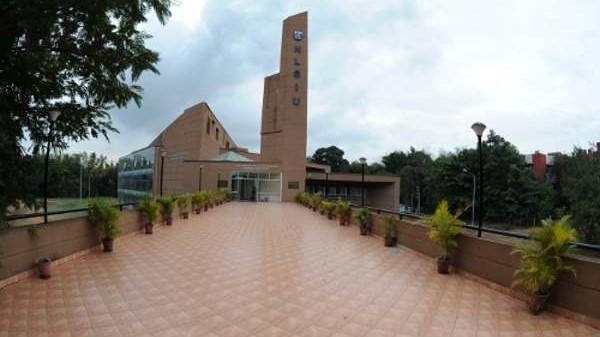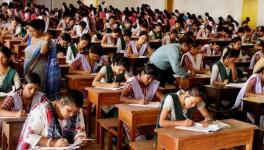A Law Student Explains Why Law Schools Fail the Differently Abled

Representational image.
The law is empowering, as a discipline and as a profession. Yet, the institutions that provide training in law are not empowering everyone equally. Most able-bodied people would say “yes, law school empowers all”, but that is because the ablest imagination is never able to go beyond the idea of a fit, eloquent and able lawyer.
People with disabilities in general, those in the field of law in particular, have been invisiblised to the extent that giving them even the slightest visibility in courtrooms, chambers of law or law schools is a mammoth task.
Persons with disabilities are generally excluded by the Indian legal system; whether they are appellants or plaintiffs, advocates or law students. This exclusion is a direct consequence of how inaccessible our courts and colleges are.
I am the first 100% visually impaired law student at the National Law School of India University (NLSIU), Bangalore. I want to throw some light on how law students are excluded by institutional and attitudinal barriers.
The National Law Universities were established to reform the legal system. Despite this, the discourse around disability rights is at an extremely nascent stage in these universities. An ablest would argue that minor shortcomings in infrastructure ought to be excused as the disabled are relatively few in number. This is to say that the largest minority on the planet is not entitled to rights, dignity and education. Not only does India have 2.68 crore people with disabilities, nearly 50% of them are below the age of 25. It should surprise no one that in the legal landscape as well, the number of persons with disabilities is increasing.
Therefore, the normative question to ask is whether institutions can deny their legal and constitutional duty to provide reasonable accommodation to persons with disability and thereby help build a Sugmya Bharat (Accessible India). The question is not how many people have disabilities. The question is whether the justification that not many with disabilities join these institutions (as students, teachers, employees or workers) is acceptable.
Another normative question is why people with disabilities stay absent from the mainstream and its discourses. Why their concerns are not taken into account is the real issue. Do we need not even think or talk about them? Is it not worth asking if they are invisible in public spaces because their disability restricts them to wheelchairs or homes.
It is now widely accepted that disability hinders individuals from reading, listening, talking and watching. In other words, they are unable to acquire skills and that is why they are unable to become independent and confident enough to make a mark in public fields.
To further elaborate, consider the institutional structures and physical infrastructures at place in the National Law Universities. They are not very promising for law students who have disabilities. Particularly in the case of NLSIU, where out of a batch of 80 or 85 students, four seats are reserved for persons with disabilities. This reservation extends to all the other National Law Universities because of the Rights of Persons with Disabilities Act, that was passed by Parliament in 2016. This Act provides for reservations for persons with disabilities.
Yet, this enactment does not stop at reservation. It talks about providing reasonable accommodation, accessible buildings and inclusive education to persons with disabilities. “Reservation in educational institutions” is not the only operative phrase in the Act. The phrase “reasonable accommodation” has legal effect too. In fact, reasonable accommodation must be considered a non-negotiable part of the Act, for reservations are redundant without it.
NLUs have definitely initiated the process of becoming more disabled-friendly but there is a long way to go. For instance, they have opened a special room for visually impaired students in the library, they have procured assistive technology, they have made some classrooms sound-proof for the benefit of students with hearing impairment and staff and student bodies have initiated programmes and workshops to promote sensitisation pertaining to disability.
Yet, the NLUs, including NLSIU, have not conducted a disability audit (a requirement under Section 48 of the Act). Nor do the NLUs have a disability policy, another requirement by law. Many places in law colleges are not accessible for wheelchairs, all the reading material is not available in a readable format and structures and evaluation patterns of many courses do not account for the challenges faced by the PWDs. Many a times, the professors and administration are unable to gauge the requirements of students with disabilities. This lack of understanding coupled with an extremely rigorous curriculum leads to alienation and exclusion.
The lack of accessible reading material, inaccessible infrastructure and insensitivity and non-cooperation on part of faculty and administration have become part and parcel of the lives of many budding lawyers with disability.
The need of the hour is for all NLUs to take proactive steps in developing equal opportunity policies, conducting disability audits, sensitising staff and students, making extensive use of assistive technology to enhance the learning experience of students with disabilities and work towards making their courses more accommodative.
The larger lesson that all NLUs and all higher education institutions in India need to learn is that they must be reasonably accommodative. Disability does not make anyone incompetent to study whereas the ablest people and surroundings do.
Nearly 45% of India’s disabled are illiterate. The other 55% are struggling to pursue their education in not-so-inclusive institutions. Data shows that not even 1% of higher education institutions in our country are disabled-friendly. This scenario tells us exactly why we need to realise the promise of an ‘Accessible India’, because wasting human capital only because some people are differently abled is neither logical nor constitutional.
Institutions need to put an immediate halt to the ablest act of invisibilising the disabled. Whether ones’ disability is visible or not, the demands of the disabled ought to be acknowledged and fulfilled. The law schools in our country have been envisioned as bastions of equality and justice. The father of modern Indian legal education, Madhav Menon founded the first law school of the country to revolutionise the legal system. This revolution should begin from within.
Anchal Bhatheja is a student at the National Law School of India University (NLSIU), Bangalore. Views are personal.
Get the latest reports & analysis with people's perspective on Protests, movements & deep analytical videos, discussions of the current affairs in your Telegram app. Subscribe to NewsClick's Telegram channel & get Real-Time updates on stories, as they get published on our website.























